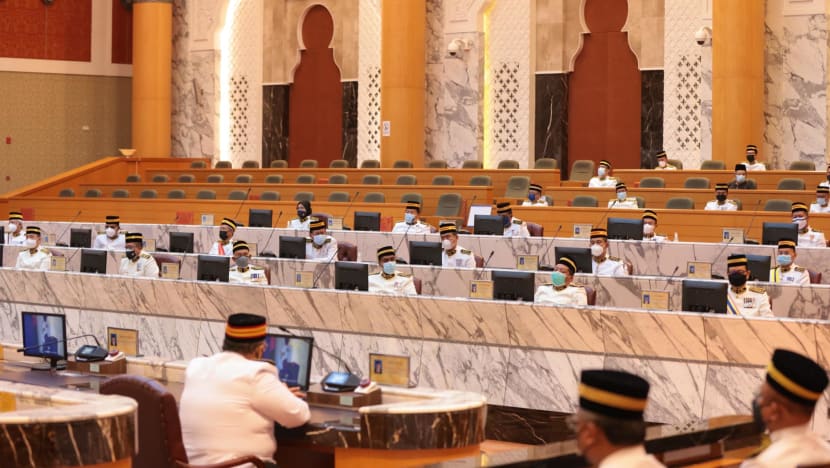UMNO dissolved Johor government around Chinese New Year to lower the voter turnout: Amanah organising secretary

KUALA LUMPUR: Political manoeuvring by the United Malays National Organisation (UMNO) to dissolve the Johor state assembly and trigger elections close to Chinese New Year is aimed at hindering ethnic Chinese residents from going out to vote, claimed Parti Amanah Negara (Amanah) organising secretary Suhaizan Kayat.
Mr Suhaizan, who was the speaker of the Johor state assembly before it was dissolved on Jan 22, made the comments during a televised dialogue shown on Astro Awani. He was participating in the dialogue on Thursday (Jan 27) evening alongside Johor’s caretaker chief minister Hasni Mohammad and Parti Islam Se-Malaysia’s commissioner in Johor Abdullah Husin.
Mr Suhaizan posited that UMNO was keen to keep voter turnout low as it would give the party a bigger chance of success in the upcoming polls.
He cited how the UMNO-led Barisan Nasional coalition clinched a resounding victory in the Melaka state election last November with a low voter turnout of around 65 per cent.
“UMNO wants the people to not go out and vote. That’s why the date is chosen (to hold elections) close to Chinese New Year. The ethnic Chinese residents will be in a festive mood and many will travel across the country to meet their loved ones,” said Mr Suhaizan.
“They will be forced to choose between enjoying the Chinese New Year festivities or to go out and vote. A lower voter turnout is exactly what UMNO wants,” he added.
Mr Suhaizan also noted that many of these Chinese voters, as evident during the 2018 General Elections, tend to back the opposition Pakatan Harapan (PH) coalition.
He added that the timing was also opportune for UMNO because many of the Johorean workers based in Singapore would find it difficult to come back to vote given the pandemic situation.
Even with Vaccinated Travel Lane arrangements in place between Singapore and Malaysia, Mr Suhaizan noted that many would find it difficult to travel home to cast their ballots due to travel quota restrictions.
“These workers are predominantly Chinese and many will not be able to vote … with current COVID-19 measures in place,” said Mr Suhaizan.
Last Saturday, Johor Sultan Ibrahim Iskandar dissolved the state assembly, paving the way for state polls to be held.
Mr Hasni, who is a member of UMNO, told reporters after the dissolution that the state government was operating at the mercy of others, with just a single seat majority.
The recent demise of Parti Pribumi Bersatu Malaysia (Bersatu) member Osman Sapian, meant that the partners ruling the Johor state government, including Bersatu and BN, held a slim one-seat majority, with 28 out of the 56 seats in total.
The PH coalition, made up of Democratic Action Party (DAP), Amanah and Parti Keadilan Rakyat (PKR), had 27 seats.
The razor-thin majority had prompted calls by certain quarters in UMNO to call for polls to consolidate power.
Responding to Mr Suhaizan, Mr Hasni said during the Thursday dialogue that the issues hindering residents from voting will impact all parties.
“All the parties contesting are affected. If we look at the Malaysians who are working in Singapore, not all of them support the opposition. There are many who support the government.
“So we are sad as well due to circumstances making it hard for them to vote,” he said.
Additionally, Mr Hasni said that BN had won 21 out of 27 seats in the Melaka state assembly with a voter turnout of just 65 per cent. He claimed that if the voter turnout had been 70 per cent, “perhaps BN would have won all 27 seats”.
The decision from the caretaker chief minister to push for the dissolution of the state assembly and call for polls has triggered criticism, with some accusing UMNO of being desperate to consolidate political power during a period when many Johoreans are grappling with the economic impact of COVID-19 and the recent floods.
However, Mr Hasni stressed during the dialogue that it was crucial that the election be held so that whoever rules the state government will do so with a simple majority of 29 seats.
“If the government has less than 29 seats, the government is not complete… that’s why an election is needed to give the people a fresh mandate,” said Mr Hasni.
He added that a stable government was key for Johor to attract investment and preserve its importance in helping to accelerate Malaysia's development.
“Johor is different from other states, it has to continue its legacy of success. It has contributed so much to the country,” said Mr Hasni.
“I am responsible for ensuring that Johor becomes a key destination for investors,” he added.

















